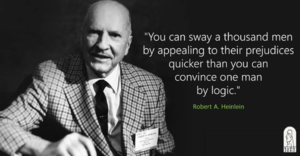Logical fallacies
From BurnZero
A logical fallacy is an argument that may sound convincing or true but is actually logically flawed. While they may seem convincing at first, logical fallacies often fall apart under scrutiny. Logical fallacies have long been used in debates to weaken an opponent's argument by pointing out its flaws and are useful in self analysis as the mind often uses erroneous arguments on oneself. The most common to look out for include:
- Anecdotal Evidence - easily found data is less trustworthy than robust data.
- Bandwagon - the popularity of an idea has absolutely no bearing on its validity.
- Appeal to Authority - an authority thinks something, it must therefore be true.
- Arrival - people tend to fixate on the destination not the journey.
- Straw Man - misrepresentation of someone's argument to make it easier to attack.
- Lesser known fallacies: False Dilemma, Hasty Generalization, Slothful Induction, Correlation/Causation, Texas Sharpshooter Fallacy, Middle Ground Fallacy, Burden of Proof Fallacy, Personal Incredulity, "No True Scotsman", Ad Hominem Fallacy and Tu Quoque.
Further reading
- Propaganda: by Edward Bernays (1928). ISBN: 978-0970312594
- The Chimp Paradox: Peters, P. S. (2012). Vermilion. ISBN: 978-0091935580

